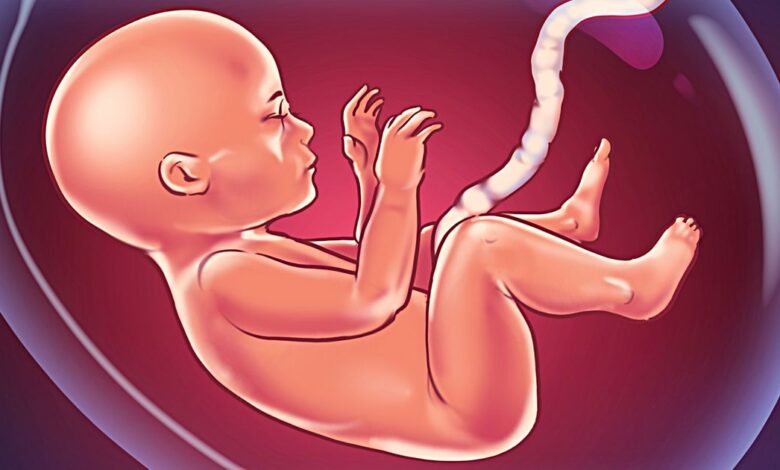Drug Abuse In Pregnancy and its Effect on the Newborn

Pregnancy is a special physiological condition where drug treatment presents a special concern because the physiology of pregnancy affects the pharmacokinetics of medications used and certain medications can reach the fetus and cause harm. Available data indicate that more than 50% of pregnant women take prescription or nonprescription (over-the-counter) drugs or use social drugs (such as tobacco and alcohol) or illicit drugs at some time during pregnancy, and the use of drugs during pregnancy is increasing. In general, drugs should not be used during pregnancy unless necessary because many can harm the fetus. Less than 2 to 3% of all birth defects result from drugs that are taken to treat a disorder or symptom.
Drug abuse represents a more serious social problem than drug dependence, as it involves a greater variety of substances and because it can occur in the absence of dependence. From prescription drugs and over-the-counter medications to street drugs and alcohol, virtually any drug can be abused. While illicit drugs like heroin and cocaine are abused any time they are used, prescription drugs are abused whenever they are used in a manner other than as intended, or by someone other than to whom they were prescribed.
What are the effects of drug abuse on the newborn?
Drugs that a pregnant woman abuses can affect the fetus in 3 principal ways, this can include:
They can act directly on the fetus causing damage or abnormal development leading to birth defects or death.
They can also alter the function of the placenta usually by constricting blood vessels and reducing the blood supply of oxygen and nutrients to the fetus from the mother and thus resulting in a baby that is underweight and underdeveloped.
They can cause the muscles of the uterus to contract forcefully; indirectly injuring the fetus by reducing the blood supply or triggering pre-term labor and delivery.
FDA Categorization Of Drugs For Use In Pregnancy
| Category | Description |
| A | Adequate, well-controlled studies in pregnant women have not shown an increased risk of fetal abnormalities. |
| B | Animal studies have revealed no evidence of harm to the fetus; however, there are no adequate and well-controlled studies in pregnant women. Or |
| Animal studies have shown an adverse effect, but adequate and well-controlled studies in pregnant women have failed to demonstrate a risk to the fetus. | |
| C | Animal studies have shown an adverse effect and there are no adequate and well-controlled studies in pregnant women. Or |
| No animal studies have been conducted and there are no adequate and well-controlled studies in pregnant women. | |
| D | Studies, adequate well-controlled or observational, in pregnant women have demonstrated a risk to the fetus. However, the benefits of therapy may outweigh the potential risk. |
| X | Studies, adequate well-controlled or observational, in animals or pregnant women have demonstrated positive evidence of fetal abnormalities. The use of the product is contraindicated in women who are or may become pregnant. |
Commonly Used Drugs In Pregnancy and Their Categories
| Drugs | Category |
| Analgesics and Antipyretics | B and C |
| Acetaminophen | B |
| Phenacetin | B |
| Aspirin | C |
| Antiemetics | B and C |
| Doxylamine | B |
| Meclizine | B |
| Cyclizine | B |
| Dimenhydrinate | B |
| Antibiotics | B, C, and D |
| Penicillin, Ampicillin, Amoxycillin, | B |
| Cloxacillin Cephalosporins | B |
| Erythromycin | B |
| Gentamicin | C |
| Amikacin | C/D |
| Streptomycin | D |
| Sulphonamides | B/D |
| Tetracyclines | D |
| Amoebicides | B |
| Metronidazole | |
| Anthelmentics | B |
| Piperazine | |
| Mebendazole | |
| Antimalarials | C |
| Antifungals | C |
| Anti TB Drugs | B and C |
| Ethambutol | B |
| INH | C |
| Rifampicin | C |
| Pyrazinamide | C |
| PAS | C |
| Vitamins | |
| B,C,D,E,folic acid | A |
| Hormones | |
| Thyroxin | A |
| Androgens | X |
| Estrogens | X |
| Progestogens- | |
| Hydroxyprogestrone | D |
| Medroxyprogestrone | D |
| Norethindrone | X |
| Norgestrel | X |
| Bronchodilators | C |
Medications Contraindicated In Pregnancy
| Drug | Comments |
| Vitamin A and its derivatives include isotretinein, accutane, and etretinate. | Significant risk of spontaneous abortion and risk of many significant anomalies. |
| ACE inhibitors | May cause kidney damage in the fetus when used in II and III trimesters, decrease in the amount of amniotic fluid, and deformities of the face, limbs, and lungs. |
| Anticoagulants- warfarin | Use during the I trimester produces defects like nasal hypoplasia and a depressed nasal bridge; termed as Fetal warfarin Syndrome. Use during II and III trimesters is associated with an increased risk of fetal malformations. |
| – Heparin | Safe but if taken for long time osteoporosis and a decrease in the number of platelets in pregnant women occurs. |
| Estrogen and Androgens | Genital tract malformations. |
| Thyroid preparations- | |
| Methimazole | Overactive and enlarged Thyroid gland |
| Carbimazole | Overactive and enlarged Thyroid gland |
| Radioactive iodine | Underactive Thyroid gland in fetus |
| Propylthiouracil | Safe. |
| Anticonvulsants- | |
| Carbamazepine | Risk of birth defects |
| Phenytoin, Phenobarbitone | The bleeding problems in the newborn can be prevented if a pregnant woman takes Vit. K by mouth every day for a month before delivery or if the newborn baby is given an injection of Vit. K soon after birth. |
| Risk of birth defects. | |
| Trimethadione | Increased risk of miscarriage in the women |
| Sodium valproate | Increased risk of birth defects in the fetus; including a cleft palate and abnormalities of the heart, face, skull, hands, or abdominal organs. |
| Antidepressants– Lithium | Birth defects (mainly of the heart), lethargy, decreased muscle tone, under activity of the Thyroid gland, and nephrogenic diabetes insipidus in the newborn. Ebstein’s anomaly (tricuspid valve malformation) has been reported in a number of fetuses exposed to this drug. |
| NSAIDs | |
| Aspirin and other Salicylates | Delay in the start of labor, premature closing of ductus arteriosus, jaundice, brain damage in the fetus, and bleeding problems in the woman during and after delivery and in the newborn. |
| Antibiotics– Tetracycline | Slowed bone growth, permanent yellowing of the teeth, and increased susceptibility to cavities in the body. |
| Chloramphenicol | Gray Baby Syndrome. |
| Ciprofloxacin | Possibility of joint abnormalities (seen in animals) |
| Kanamycin and Streptomycin | Damage to fetus’s ear resulting in deafness (risk of ototoxicity) |
| Sulfonamides | Jaundice and brain damage in newborn |
| Antineoplastic agents- | |
| Busulfan | Birth defects such as less than expected growth before birth, underdevelopment of the lower jaw, cleft palate, abnormal development of skull bones, spinal defects, ear defects, and club foot. |
| Chlorambucil | |
| Cyclophosphamide | |
| Methotrexate | |
| Oral Hypoglycemic drugs | A very low level of sugar in the blood of newborns. Inadequate control of diabetes in the pregnant woman |
| Chlorpropamide | |
| Tolbutamide |
List of recreational drugs that can affect your pregnancy and your baby
There are several recreational drugs that can also affect your baby during pregnancy, they include:
Ecstasy (MDMA): Ecstasy is absorbed into the bloodstream and is transferred across the placenta to the baby. One study has shown that heavy MDMA use in pregnancy is associated with poorer mental and motor development in infants at 12 months old. There is also some evidence to suggest that it can lead to an increased risk of the baby having birth defects. However, this is limited research and we do not know for sure.
Cannabis (marijuana,): Experts don’t know exactly what harm cannabis causes during pregnancy because it is often used with other drugs, such as tobacco and alcohol, so it’s difficult to separate the effects. The combination can cause growth restriction (your baby not growing properly), baby being born too early (prematurely), and having breathing and feeding problems when born.
MCAT: The So-called ‘legal highs’ (they are not legal) are drugs that are created chemically. As they are relatively new, there is very little research about them and their effects on pregnancy. It is thought that they have effects similar to that of ecstasy and crack cocaine.
Cocaine and speed: Cocaine (including crack cocaine) and methamphetamine (speed, or ice) are powerful stimulants that affect the central nervous system. Using these drugs during pregnancy may affect your baby’s growth and puts you at higher risk of miscarriage, early labor, and placental abruption, where the placenta comes away from the wall of the womb, causing bleeding and potentially serious problems for you and your baby. These drugs also cross the placenta and are absorbed by the baby. They reach the baby’s heart, brain, and other organs.
If these drugs are taken late in pregnancy, your baby may be born with these in their system and have to go through withdrawal after birth. Shaking, muscle spasms and problems with sleeping and feeding are all signs that your baby is coming off these drugs.





